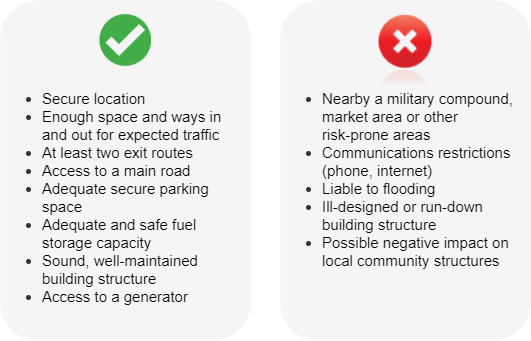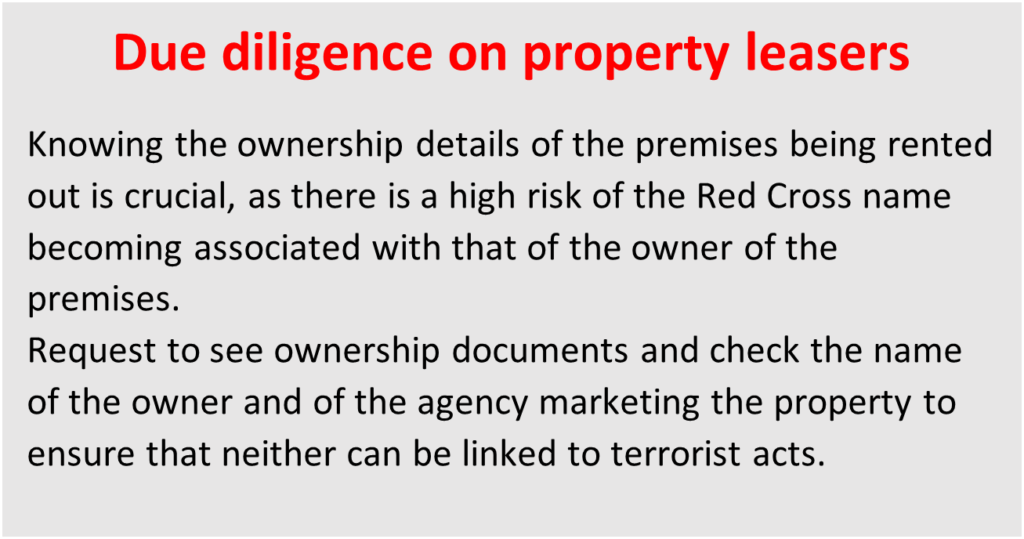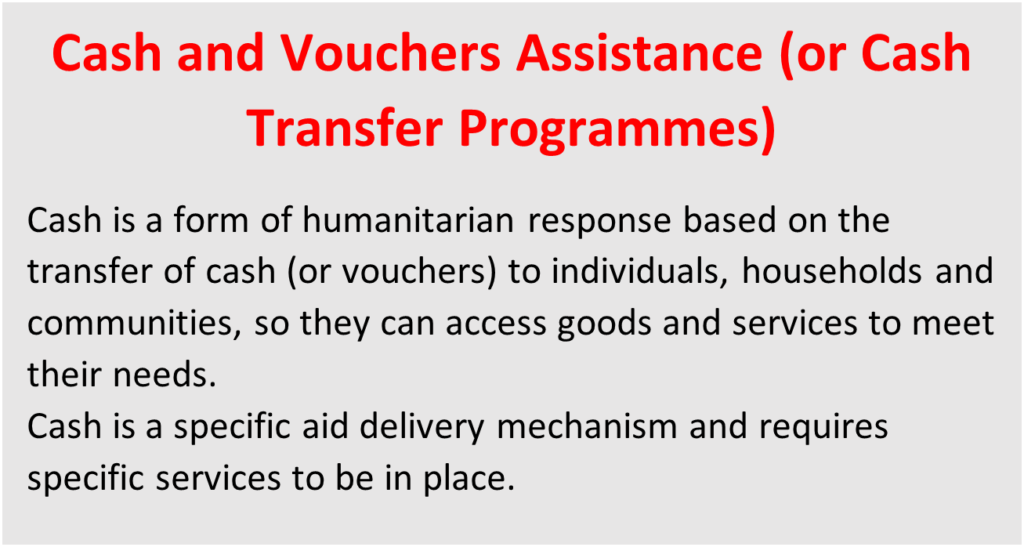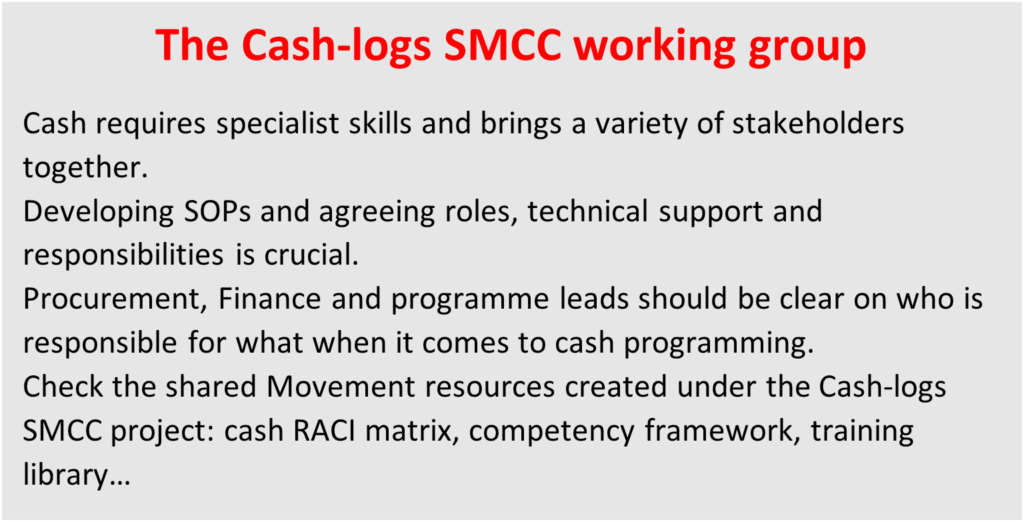How Can We Help?
Procurement of special items and services
Medical procurement
Needs definition
- clear specifications including shelf life requirements
- use medicinal names rather than brand names
- special requirements
- include sample quantities in total order where necessary.
Shelf life calculations
- Paracetamol has a 30-month shelf life. Requestor asks for 90 per cent remaining shelf life (27 months) at delivery.
- Import lead time is four months.
- International procurement will not comply with requestor’s requirements. Options: lower the minimum remaining shelf life required or procure locally.
Supply chain requirements
- Restricted items mean stricter import rules and controls.
- Check transport and storage conditions needs (ex: cold chain).
- Check who can be a consignee of imported medical supplies.
- Check requirement for testing or sampling at arrival in country.
National regulations
- Check national essential medicines list for any limitations or requirements in importations.
- Some countries require that importers of specific medical suppliers be registered as such.
Procurement agent services
- Procurement can be delegated to a procurement agent (at a cost).
- Tendering is required for procurement agent contracting.
Supplier selection
- Request for support from / procurement experts.
- All procurement of medical items done under IFRC rules must be approved at GVA level.
Read more about medical procurement here.
Consultancy services procurement
In the British Red Cross, this is currently not managed by logisticians, although this is under discussion as it technically is a procurement process – contact international HR for details on the process to recruit consultants.
A process flowchart is available from international HR for more details on consultancy services procurement.
Facilities rental services procurement
The needs definition phase should focus on:
- area of choice
- safety and security
- building/compound size
- number of bedrooms/offices required
- amenities
- space needed for parking vehicles and storage
- preference for serviced property.
Seek recommendations from peer organisations or rental agencies, with options compared in a format.
The CBA and the recommendation should then be approved by a budget holder, procurement manager and finance manager, with the security focal point included for information.
Negotiations with selected supplier or service provider should ensue.
Negotiation points should confirm:
- rent amount
- regularity of payment
- period of notice to close contract
- shared maintenance responsibilities
- responsibility for building and contents insurance
- responsibility for payment of utilities.
Due diligence must be carried out before the contract is issued to the supplier or service provider.
Rental invoices should be sent directly to the finance team (or in British Red Cross UK) for payment with a copy of the rental contract.
Facilities management in the UK
In the UK, the facilities team at will support the selection and contracting process. The facilities team should receive invoices for all property rentals and process property-related payments directly.
SSC holds a framework agreement covering maintenance and services to property rented by the British Red Cross. Service requests must be placed through SSC’s support desk, who liaise with the facilities management company and allocate a level of urgency to every request.
Requestors of building services will be informed of the timeline for service delivery directly. More information on the facilities team and their support can be found on Redroom.
There is a requirement for the British Red Cross to have specific documents available on British Red Cross-run sites at all times, in a “statutory documents folder”. More information about the statutory documents folder can be found on Redroom.
Selection criteria for rental premises
In general

Given the status of in country (working for the and not having legal authority in country), whenever considering property rentals, make sure the legal authority in country is involved in the process and kept informed at all stages.
The lease agreement must eventually be signed by the legal authority in country.
Warehouse selection
See the Building a stock strategy and Sourcing a warehouse sections of the Warehousing chapter.
Accommodation
As a rule, prioritise secure facilities such as an apartment, house or other fully self-contained area, or containers or prefabricated buildings in a compound. Considerations listed in the In general section apply.
Office space
Where the British Red Cross works in partnerships, it is usually possible to be hosted by either the , the or the , following the terms of an integration or service agreement (IA). The use of office equipment is usually provided on either a free or cost-sharing basis, or as part of the service/integration agreement.
Sharing premises within the Movement
As a , it is usually not possible to acquire land or property in a country other than the PNS’s own; however, where relevant, a business case should be put together to provide a costs-benefit analysis to compare acquisition and rental options. A PNS willing to rent premises outside their own country would have to go through the or to rent spaces for them.
If renting space from the IFRC, service charges must be defined as part of the integration agreement or through a separate agreement.
See the Policy and Procedure for Provision of Integration and Administrative Services for National Societies from the IFRC for more details on integration and service agreements.

If renting space from the HNS, service charges can either be defined in the or agreed locally.
Any examination of a new site should use the security audit checklist and ideally be carried out by a security adviser from the IFRC.
Clearing and forwarding services procurement
Read about the procurement of clearing and forwarding services here.
Procurement to support cash programme delivery
For more details and useful resources about cash programming, refer to the British Red Cross Cash Hub.
The Cash Hub platform, hosted by the British Red Cross as a shared leadership initiative with and , has been launched as a global resource for the Movement to help increase the Movement’s capacity to deliver cash assistance. All templates referred to in this section are available on the Cash Hub via the search function, mostly from the Cash and logistics section.
Visit the Cash Hub here and join the online cash community of the Movement: the platform offers support to expand our knowledge, skills and networks in different ways, such as searching through a range of resources, training opportunities, programme guidance and tools, or accessing interactive cash maps with key data on cash programmes.
The vast majority of cash programmes will require tendering for financial services and/or voucher services. The requirements for cash services must be defined by the programme team, using the scope of work template and the response sheet as a reference. Note that there are separate response sheet templates to use for procurement and voucher vendors procurement. Using these resources will ensure that you collect the minimum information necessary to ensure the tender is successful.

The modalities of cash distributions must be defined in a supply chain strategy and associated services must be captured in a procurement plan, so they can be sourced, contracted and monitored by procurement experts with consultation of finance and programme experts.
Cash services providers must be evaluated jointly by programme, finance and logistics, through a tender process or a simple .
The most common services that cash programmes require are:
| Delivery mechanism | Cash transfer | Cash transfer |
|---|---|---|
| Modalities | Individual cash assistance Community grants | Vouchers |
| Options | Direct cash distribution Cash by third party provider e.g. Bank, post office, mobile phone company, money transfer service, Hawala | Value vouchers* - beneficiaries purchase whatever they need, up to voucher face value Commodity vouchers - beneficiaries purchase a specific commodity, price pre-agreed with traders and retailers |
*Although beneficiaries can choose what they want to buy, the choice will still be limited to the products a certain shop offers, and often limited to a pre-determined set of items.
To define the procurement process to follow, refer to the flowcharts in the Quote-based procurement section of Sourcing for procurement, making sure the distinction is made between the value of the vouchers or amount of cash distributed and the cost of delivery.
The ICRC have published a step-by-step guide to cash transfer programmes tendering on the Cash Hub which helps planning for the entire procurement process.
Take the Cash assistance through Financial Services Provider training, a 90-minute online modular training outlining critical steps and tools to successfully contract an FSP. The training is accessible from the Cash Hub here.
Cash procurement rules:
- Value voucher cash programmes – Only service fees to be charged by the third party or transfer service provider define the authorisation level and procurement process to follow (e.g. services to print vouchers or to encash vouchers), not the face value of the vouchers distributed.
- Commodities voucher cash programmes – The combined value of the commodities and service fee determine the authorisation level and procurement process to be followed.
- Cash assistance through Financial Service Provider – < 1,000 CHF: single quote procurements is sufficient but regional/central quality check required. Use of the SoW response document is not mandatory but recommended.
> 1,000 CHF: Run tender (preferably restricted) with support from regional/central logistics team (UKO, IFRC or ICRC).
See the Assessment section on the Cash Hub for guidance on tendering for financial service providers.
The following applies to all services:
- Where the procurement experts reviewing the process identify a risk, they may escalate its validation to the funding for further review.
- The selection of a financial services provider should always be validated by a central procurement team (PNS at minimum, funding PNS where value of procurement is greater than £25,000).
Sourcing a financial services provider
Look up existing resources on the Cash Hub, under the assessment section, to find guidance on how to assess service providers and lay out a risk register for a cash response.
The roadmap at the start of the assessment section gives useful general information, and the “financial service providers baseline checklist” and the “mapping service provider template” are also available. There is also an “assessing FS topics and sources template”. All templates are available from the Cash Hub.
Other information sources that can support the selection of an :
- Logistics, procurement and programmes collect information on the service providers in the market. Finance should be included in the assessment, too – if possible, they should lead, together with programme, as they have the necessary technical knowledge of FSPs.
- Finance should also be involved in setting the requirements for FSPs, as they will need to be able to transfer the money to them, pay them on time and have the requirements met for reconciliation of funds. They may also hold a list of potential FSPs.
- Identify and narrow down potential service providers that fulfil your requirements. Sourcing can also be supported by consulting other humanitarian organisations that already implement cash-based responses and have established contracts with service providers.
- The FSP Framework Agreement Tip Sheet available from the Cash hub provides an outline of the critical differences if a long term (2-4 year) framework agreement is put in place rather than a standard service contract to ensure the process is completed comprehensively, and in compliance with the IFRC Procurement Manual.
There are strong regulatory controls around financial transfer services including (but not limited to) anti-money laundering (AML); counter-terrorism financing (CTF) and know your customer (KYC) procedures. Due diligence is therefore a key mitigating action against the risk of using an FSP for the delivery of a cash programme and will ensure both compliance and the technical quality of the services delivered.
A pre-qualification step should occur before the tender is published, with a Request For Information (very similar to the ) sent to potential suppliers (the supplier registration form can be used as an when accompanied by background information on the future tender). The FSPs who respond should be evaluated against a pre-defined set of criteria. Pre-qualified suppliers should then be invited to tender (see the Tendering for goods and services section of Sourcing for procurement for more details on restricted/open tenders). This is the preferred option, but if there is insufficient time to undertake two steps, an open tender can be the preferred route to select an FSP. Technical and financial proposals must be requested and received from suppliers or FSPs and after the technical evaluation only those eligible will be considered for the financial evaluation.
Standard selection criteria for FSPs
Check the Cash Hub’s Procurement tools and templates section for guidance on the selection of service providers and use the CBA template for Financial Services Providers (FSPs) available in the section resources to define criteria and requirements.
Standard criteria include:
- Can the pre-finance the cash grants value?
- Does the FSP charge account fees to users and recipients? If so, cost of account fee must be included in the amount of cash distributed.
- Payment terms: unless otherwise agreed with the FSP, the payment terms of the procuring PNS will apply. Payment should be processed following thorough reconciliation.
A standard contract for FSP has been designed by the . It will require adapting to the contracting organisation’s specific requirements.
For a voucher programme, retailers need to be contracted as service providers and all usual contracting requirements should be followed. A tip sheet for voucher programmes is available from the Cash Hub. A standard template for voucher printing services is also available from the Cash Hub under the Procurement tools and templates section.

Regular monitoring of the retailers and voucher providers is important from the procurement side, to ensure they hold the right items (in quantity and quality), offer fair and transparent prices, etc. The information collected from the retailers must then be triangulated with the beneficiary monitoring data to initiate payment of the retailers and of the voucher provider (reconciliation).
When using FSP services to transfer cash to beneficiaries, logistics must be involved in the reconciliation process before payments are processed. Logistics also supports the performance management of the selected FSP(s) throughout the contract implementation phase – see the Managing the performance of contracts and suppliers section of Managing procurement).
The reconciliation process should be formalised with a Certificate of completion and/or a service delivery note, available from the procurement tools on the Cash Hub.
Construction material
Where construction activities aren’t subcontracted, the organisation takes responsibility for conducting the procurement of construction materials.
A supply chain strategy is important for any programme requiring supplies but is crucial for construction projects. An analysis of the supply options needs to be included in the programme design.
Some points to consider when procuring construction items:
Direct delivery to construction sites
- Direct delivery by supplier is preferred.
- If supplier enters organisation’s premises, ensure safe access and prevent any image issues due to association (thorough supplier due diligence, precise communication to staff and other visitors).
Quality control
- Consider hiring external resource to help with QC.
- Quality of supplies AND quality of service must be controlled.
- Assess supplier supply chain (ethical due diligence).
Storage of construction materials
- Consider whether to use own warehouse vs temporary storage vs drip-feed deliveries.
- Ensure safe storage.
- Consider storage support options from local community.
Construction timeline
- Often under one year in duration.
- Build staggered deliveries into agreement with supplier.
Price fluctuation
- As much as possible, agree fixed prices for the duration of the works.
Location of construction site(s)
- Must have access to local markets.
- Include transport costs in project budget.
Note that all procurement of construction items or services done under procurement rules MUST be approved by the procurement authority in Geneva before issuing a contract.
Food and seeds
The British Red Cross rarely supports the procurement of food and seeds. National Societies would typically seek advice from the or purchasing teams for such procurements, to manage the risks associated with procurement of food and seeds (mostly phytosanitary). For further information, see Section 3.4 of the IFRC’s procurement manual, which is dedicated to the procurement of food and seeds.
In many ways, the standards for procuring food and seeds are similar to those that apply to procurement of medical items: strong controls are in place to ensure goods are fit for consumption, and to protect national production – some countries will not allow food and seeds to be imported for example.
Always refer to your regional logistics coordinator for advice on procuring food or seeds.
Vehicles
See the Fleet chapter for details on the procurement of fleet.
Read the next chapter on Warehousing here.
Related resources
Download useful tools and templates

